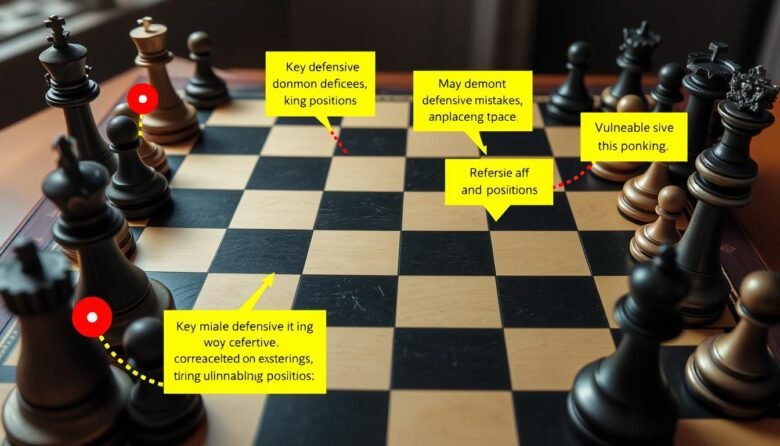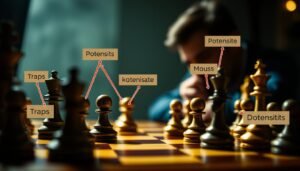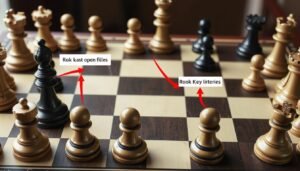In the world of chess, knowing common defensive mistakes is key. Defense is crucial as it keeps the king and other pieces safe. It also prepares for strong counterattacks. By spotting and fixing these mistakes, players can greatly improve their defensive game.
Understanding the Importance of Defense in Chess
In chess, defense is key. Good defense strategies are the foundation of a winning game. Knowing how to defend is crucial for all players. It helps them deal with their opponents’ attacks.
The Role of Defense in Chess Strategy
Defense is a big part of chess strategy. It helps prevent threats and creates chances. Players who focus on defense can better respond to their opponents. This keeps them in control and limits their opponent’s moves.
Positive Impacts of Good Defensive Play
Good defense in chess brings many benefits. It keeps important pieces safe and builds a strong position. It also helps develop tactical advantages. A solid defense can scare opponents, making them make mistakes.
Highlighting defense’s importance boosts gameplay and confidence. It shows a player’s skill and ability.
Consequences of Poor Defensive Decisions
Poor defense can lead to big problems. Common defensive mistakes can cause blunders. These blunders can lose key pieces or lead to checkmates.
Such errors can ruin a player’s position and lead to quick losses. Knowing defensive principles is a way to avoid these mistakes.
Identifying Common Defensive Mistakes
Chess players often face many defensive pitfalls. These can greatly affect their game results. Knowing these common mistakes helps improve strategies and outcomes. Here are three major errors to watch out for:
Overextending Pawns
Pawn structure is key to a strong defense. Overextending pawns weakens your position. This makes it easier for opponents to attack.
Advancing pawns too far can leave your flanks open. It also lets enemy pieces move in easily. This is a major mistake in chess defense.
Neglecting King Safety
Keeping the king safe is crucial throughout the game. Neglecting the king can lead to direct threats and attacks. This increases the risk of checkmate.
Many players forget the importance of a well-protected king. A safe king is vital for a strong defense. Ignoring this can lead to unexpected losses.
Failing to Develop Pieces
Proper piece development is essential for a good defense. Not moving pieces well limits your options. It makes your position weak and exposes you to threats.
Understanding the importance of piece mobility helps avoid this mistake. It’s a common error that can cost you the game.
Failing to Recognize Threats
In chess, players often struggle to see threats from their opponents. Not understanding an opponent’s plans can lead to big mistakes. It’s important to stay alert and know what threats are coming.
Misjudging Opponent’s Intentions
One common mistake is misunderstanding an opponent’s moves. Sometimes, a player thinks an attack is just a trick. This can leave important pieces open or let a surprise tactic happen.
It’s key to understand what your opponent is trying to do. This helps avoid traps and improve your defense.
Ignoring Tactical Opportunities
Missing chances to counterattack is also a big mistake. Players might overlook moves that could change the game. Not seeing chances to attack back can let the opponent gain an advantage.
Knowing your own chances to attack can make your defense more active. It turns a passive defense into a strong one.
Not Prioritizing King Safety
King safety is key to winning in chess. Ignoring this can lead to big problems. It’s important to know how to keep the king safe.
Importance of Castling Timely
Castling makes the king safer and links rooks for better teamwork. It’s best to do it early to keep the king safe. A king in the center is easy to attack, leading to common mistakes.
Avoiding the Back Rank Mate
To avoid back rank mate, the king must have escape routes. If the king is stuck, it can lead to quick losses. Players need to watch out for these dangers and keep their king safe.
Neglecting Control of the Center
Controlling the center squares in chess is key for a strong defense. It lets players influence important areas, boosting their strategic options. Many players miss the importance of central control, leading to common mistakes.
Impact of Central Control on Defense
Having control of the center lets pieces affect more of the board. A strong center makes defenses better, helping players see threats and act fast. It also sets up chances for counterattacks, turning defense into offense.
Strategies for Maintaining Center Control
To keep control of the center, try these strategies:
- Mobilize pieces to central squares early to dominate.
- Use pawns to build a solid center, protecting key squares.
- Watch your opponent and stop them from taking central territory.
- Keep your pieces flexible to quickly respond to threats.
Underestimating Opponent’s Tactics
Thinking an opponent is not skilled can hurt your chess game a lot. Many players think their plans are perfect. But, it’s key to see and handle tactics well to defend well.
Identifying Tactical Patterns
Good chess defense means spotting tactics. Players should:
- Look for common tactics like forks, pins, and skewers.
- Check their own setup for weak spots.
- Think about what threats might come their way.
Importance of Reviewing Opponent’s Moves
Looking back at an opponent’s moves helps a lot. It makes you better at defending and less likely to make mistakes. Players should:
- Study past games to learn from mistakes.
- Understand opponents’ plans to fight back better.
- Use past errors to avoid the same traps later.
Failing to Coordinate Pieces
Good chess defense needs pieces working together. When they do, each piece helps the others, making the defense stronger. But, if pieces don’t work together, there are holes in the defense that opponents can use.
Having a solid plan helps improve your chess defense. It makes your game stronger and more solid.
The Importance of Piece Harmony
Piece harmony is key in chess defense. Each piece has its own strengths that help defend well. When pieces work together, they can protect each other’s weak spots.
This teamwork makes it harder for opponents to attack. It creates a strong defense that can handle different threats.
Strategies for Effective Piece Coordination
To get better at chess defense, use these strategies:
- Build a solid pawn structure to support your pieces.
- Place pieces to defend important squares, covering each other’s attacks.
- Use rooks and bishops together to control open paths and diagonals.
- Keep your formation flexible to quickly respond to threats.
Becoming Too Passive
In chess, finding the right balance between attack and defense is key. Being careful is good, but being too passive can miss chances and let the opponent set the game’s pace. It’s important to know when you’re getting too passive to avoid common mistakes.
Dangers of Excessive Caution
Playing too safe can slow you down and make your position weak. This caution invites your opponent to attack. The main risks of being too cautious are:
- Letting the opponent control the center of the board.
- Missing chances to make smart defensive moves.
- Limiting your chances to counterattack.
When to Switch from Defense to Offense
Knowing when to switch from defense to offense can turn the game around. Look for these signs to change your strategy:
- The opponent overextends, showing weaknesses.
- You’ve defended well against immediate threats.
- There are chances for tactical counterattacks.
By spotting these moments, you can avoid being too passive and take control. This leads to better overall play.
Not Utilizing Defense Resources
In chess, using resources wisely is key to a strong defense. Many players make mistakes by not knowing which pieces to use for defense. It’s important to pick the right pieces to protect against threats.
Recognizing Potential Defenders
Every piece on the board has its own strengths for defense. Rooks, knights, bishops, and the queen can all be defenders, depending on where they are. Knowing what each piece can do helps make better defensive moves.
For example, not using rooks in the back row can leave the king exposed. This is a common mistake that can weaken your defense.
Best Practices for Defensive Resource Allocation
Here are some strategies for using resources well:
- Prioritizing key pieces: Choose pieces that can block many threats or protect against attacks.
- Maintaining piece flexibility: Don’t put too many pieces in one spot until you have to.
- Positioning for synergy: Make sure pieces work together for a strong defense.
Following these tips can help avoid common defensive mistakes. By using resources smartly, players can improve their chances of winning and reduce risks.
Preparing for Counterattacks
In chess, players often face a strong opponent on the defensive side. It’s not just about protecting your pieces. It’s also about finding chances to counterattack. A good counterattack can change the game by weakening your opponent’s moves and starting a new attack.
Importance of Counterattack in Defense
Counterattacks are key in chess defense. They help a player take back control when they’re under attack. Knowing when to switch from defense to offense is vital. This can surprise your opponent and open up new chances for you.
Recognizing Opportunities for Counterplay
Finding the right time for a counterattack takes sharp eyes and strategy. Look for signs that your opponent is overextending or for tactical chances. Here are some ways to get better at this:
- Analyze past games for successful counterattacks.
- Practice with chess puzzles that involve counterattacks.
- Study openings that lead to counterplay, preparing you better.
Improving your counterattack skills makes you a better chess player. It helps you balance defense and offense. This makes you ready for any game situation.
Techniques to Improve Defensive Play
To get better at chess defense, you need a solid plan. Start with targeted exercises that mimic real games. These help you learn to react quickly to threats.
Practicing Defensive Exercises
Adding drills to your practice routine is key. You can solve puzzles or study famous defensive games. This way, you learn to handle any defensive situation that comes up.
Learning from Mistakes Through Analysis
Looking back at past games is also important. Reviewing your mistakes helps you spot patterns. This way, you can improve your defensive strategy and feel more confident in your moves.




